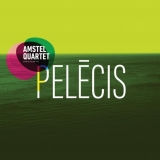Das Amstel Quartet spielt Musik des lettischen Komponisten Georgs Pelecis. Mit Ausnahme der Sunlight Sonata mit ihren melancholischen Sätzen Konfession und Weinen, sowie den positiv beschwingten Sätzen Trost und Absolution sowie den besinnlichen Weihnachtsmelodien ist dies ein unbeschwertes Programm, das Pelecis’ ‘Einfachheit’ zeigt. Pelecis ist Lette und erhielt seine musikalische Ausbildung in der Sowjetzeit am Tchaikovsky-Konservatorium in Moskau u.a. bei Aram Khachaturian. Seine Musik ist keinesfalls als modern zu bezeichnen, nie dissonant, sondern konsonant in einem persönlichen und eben sehr einfachen Stil, der in der Renaissance ebenso Inspiration findet wie im Minimalismus. In anderen Worten: es ist eine angenehme, unterhaltsame Stimmungsmusik mit viel Wohlklang.
In der Zusammenarbeit mit verschiedenen Solisten zeigt das Amstel Quartet mit feinem Raffinement, viel Lyrismus wie auch vitalem Rhythmus ein gutes Gespür für Pelecis’ Melodien und kann dem Hörer einmal mehr etwas sehr Besonderes, Bereicherndes anbieten.
The Amstel Quartet plays music by Latvian composer Georgs Pelecis. With the exception of the Sunlight Sonata, with its melancholy movements Confession and Weeping, and the positively upbeat movements Consolation and Absolution, as well as the contemplative Christmas melodies, this is a light-hearted program that showcases Pelecis’ ‘simplicity’. Pelecis is Latvian and received his musical training during the Soviet era at the Tchaikovsky Conservatory in Moscow with, among others, Aram Khachaturian. His music is by no means to be called modern, never dissonant, but consonant in a personal and just very simple style that finds inspiration in the Renaissance as well as in minimalism. In other words, it is a pleasant, entertaining atmospheric music with a lot of euphony.
In collaboration with various soloists, the Amstel Quartet presents a good sense of Pelecis’ melodies with fine refinement, much lyricism as well as vital rhythm, and can once again offer the listener something very special, enriching.
























